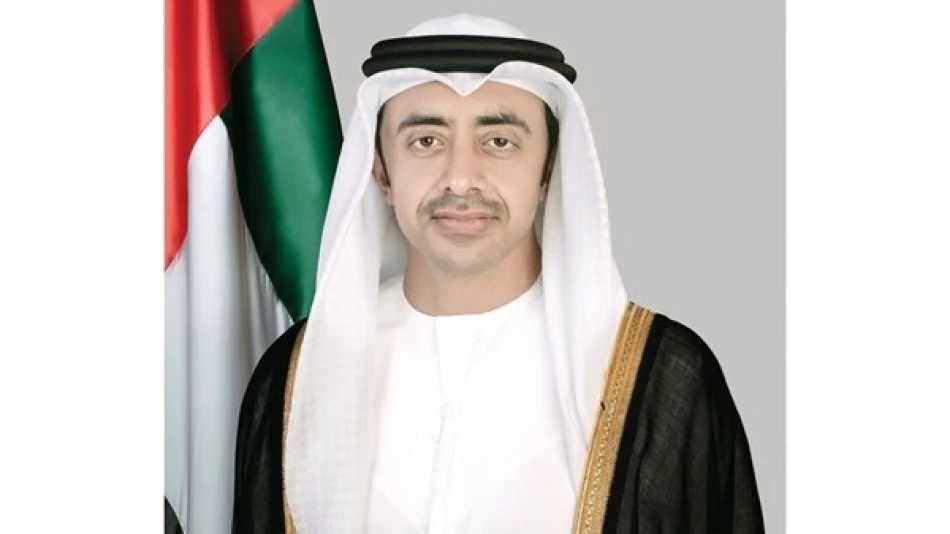
Abdullah bin Zayed Welcomes Global Recognition of Palestine, Urges Decisive International Action
UAE Foreign Minister Hails Growing International Recognition of Palestinian Statehood as Diplomatic Momentum Builds
The UAE's Foreign Minister Sheikh Abdullah bin Zayed Al Nahyan has welcomed intentions by ten countries—including Malta, Canada, Australia, and several European nations—to recognize Palestinian statehood, describing the moves as historic steps that reflect growing international support for Palestinian rights. The diplomatic endorsement signals a potential shift in global consensus on the decades-old conflict, even as Israel faces mounting international pressure over its conduct in Gaza.
A Coordinated Diplomatic Push
Sheikh Abdullah bin Zayed's statement encompasses recognition intentions from Malta, Canada, Australia, Andorra, Finland, Iceland, Luxembourg, New Zealand, Portugal, and San Marino. This represents a significant expansion beyond the 139 UN member states that currently recognize Palestine, bringing the issue closer to a critical mass of international legitimacy.
The timing appears deliberate, coming amid heightened global scrutiny of Israeli military operations in Gaza and growing calls for a two-state solution. Unlike previous recognition waves that often followed specific conflict escalations, this movement appears more coordinated and sustained.
Strategic Implications for Regional Diplomacy
UAE's Evolving Position
The UAE's strong endorsement is particularly noteworthy given its 2020 Abraham Accords normalization with Israel. Rather than representing a contradiction, this stance suggests the Emirates views Palestinian recognition as complementary to regional stability—a position that could influence other Gulf states and provide diplomatic cover for continued Israeli-UAE cooperation while supporting Palestinian aspirations.
Pressure on Holdout Nations
Sheikh Abdullah's call for broader international recognition specifically targets the moral, humanitarian, and legal responsibilities of the global community. This language appears aimed at Western nations—particularly the United States and major European powers—that have historically conditioned Palestinian recognition on direct negotiations with Israel.
Market and Economic Considerations
For investors and regional markets, this diplomatic momentum could signal several developments. Energy markets may factor in potential shifts in Middle Eastern stability, while defense contractors might anticipate changes in regional security arrangements. More significantly, increased Palestinian recognition could accelerate international investment in Palestinian territories and influence trade relationships across the region.
The UAE's position also suggests confidence that supporting Palestinian statehood won't jeopardize its growing economic ties with Israel, potentially creating a template for other Arab nations to balance normalization with traditional Palestinian solidarity.
Historical Context and Precedent
This recognition wave echoes similar moments in diplomatic history, particularly the coordinated recognition of Israel itself in 1948-1949 and the gradual acceptance of other contested states. The inclusion of established Western democracies like Canada and Australia alongside smaller European nations creates a diverse coalition that transcends traditional geopolitical blocs.
Unlike previous Palestinian recognition waves driven primarily by Non-Aligned Movement countries in the 1980s and Latin American nations in the 2010s, this group includes economically significant nations with strong ties to both Israel and the United States, potentially making their positions harder to dismiss or reverse.
Challenges and Limitations
Despite the diplomatic momentum, practical obstacles remain substantial. Palestinian recognition without corresponding Israeli acceptance or clear territorial boundaries remains largely symbolic. The ongoing division between the Palestinian Authority in the West Bank and Hamas in Gaza also complicates questions of which entity these countries would recognize as the legitimate Palestinian government.
However, the UAE's framing of recognition as supporting "comprehensive and just resolution" rather than prejudging final status issues suggests a pragmatic approach that could provide flexibility for future negotiations while establishing Palestinian legitimacy as a negotiating partner.
Most Viewed News

 Layla Al Mansoori
Layla Al Mansoori






